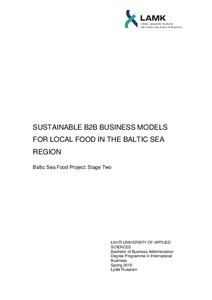Sustainable B2B Business Models For Local Food in the Baltic Sea Region: Baltic Sea Food Project: Stage Two
Rusanen, Lydia (2019)
Rusanen, Lydia
2019
All rights reserved. This publication is copyrighted. You may download, display and print it for Your own personal use. Commercial use is prohibited.
Julkaisun pysyvä osoite on
https://urn.fi/URN:NBN:fi:amk-201905027326
https://urn.fi/URN:NBN:fi:amk-201905027326
Tiivistelmä
The swelling population and resulting increase in food demand are being partially met by the mainstream agriculture and food systems worldwide. As these global food systems expand, so has the consumer interest in alternative food networks, fed by the demand for environmental and health conscious options. Micro businesses and SMEs have seized this opportunity to build local food systems (LFS). However, traditional B2C local food solutions are insufficient when trying to build a sustainable B2B business in the 21st century. Innovative approaches are needed.
Across the Baltic Sea Region (BSR), networks have been formed and solutions to creating a sustainable business and satisfying demand in both the B2C and B2B sector are varied. This thesis is based on the research part of the Baltic Sea Food Project - a project funded by Interreg and the EU, aiming to develop B2B business models within the local food sector in the Baltic Sea Region.
Using an inductive approach, this thesis compares local food systems in ten Baltic Sea countries to emphasise successful practices and to reveal challenges facing the four main stakeholder groups. Both quantitative and qualitative data are utilised, including surveys, focus groups and interviews. The findings are analysed using the Business Model Canvas and presented using the same format.
The findings show that similar challenges are experienced across the BSR and although every LFS is different, common recommendations can benefit each region. These recommendations point towards a more integrated LFS, with improved methods for communication, easier routes for placing orders and invoicing and more collaboration when it comes to deliveries. Ideally, the use of appropriate delivery hubs is recommended. The need for improved public awareness of local food was another important finding, going hand in hand with better branding and marketing practices. Finally, and most importantly, the use of storytelling supported by blockchain as a form of credibility and transparency is a key recommendation that promises to support local food prices and attractiveness.
Across the Baltic Sea Region (BSR), networks have been formed and solutions to creating a sustainable business and satisfying demand in both the B2C and B2B sector are varied. This thesis is based on the research part of the Baltic Sea Food Project - a project funded by Interreg and the EU, aiming to develop B2B business models within the local food sector in the Baltic Sea Region.
Using an inductive approach, this thesis compares local food systems in ten Baltic Sea countries to emphasise successful practices and to reveal challenges facing the four main stakeholder groups. Both quantitative and qualitative data are utilised, including surveys, focus groups and interviews. The findings are analysed using the Business Model Canvas and presented using the same format.
The findings show that similar challenges are experienced across the BSR and although every LFS is different, common recommendations can benefit each region. These recommendations point towards a more integrated LFS, with improved methods for communication, easier routes for placing orders and invoicing and more collaboration when it comes to deliveries. Ideally, the use of appropriate delivery hubs is recommended. The need for improved public awareness of local food was another important finding, going hand in hand with better branding and marketing practices. Finally, and most importantly, the use of storytelling supported by blockchain as a form of credibility and transparency is a key recommendation that promises to support local food prices and attractiveness.
